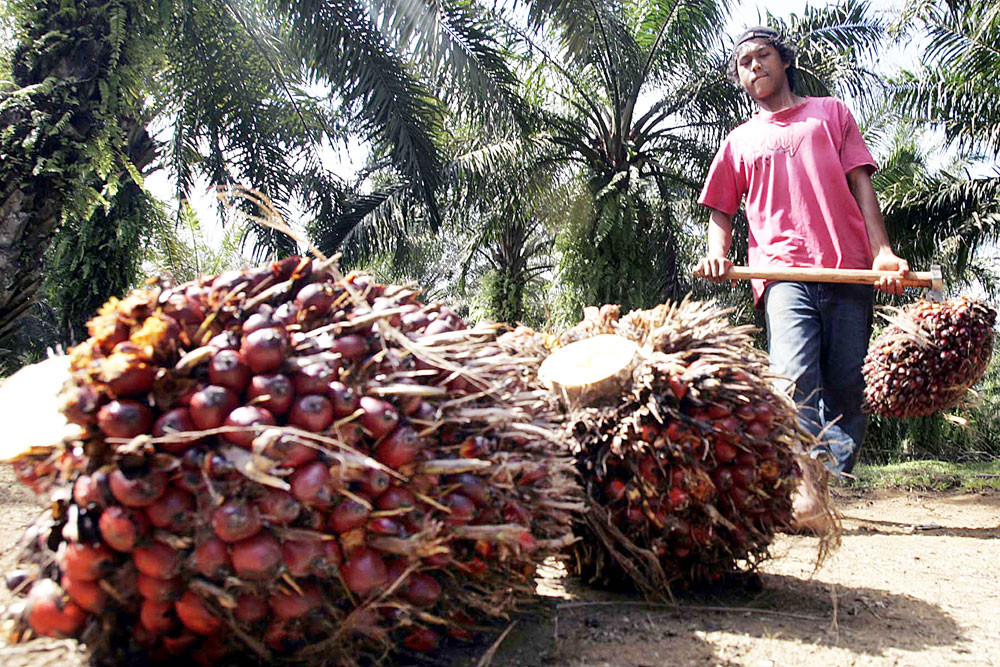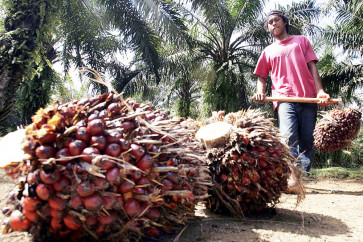Popular Reads
Top Results
Can't find what you're looking for?
View all search resultsPopular Reads
Top Results
Can't find what you're looking for?
View all search resultsImproving sustainable Indonesian palm oil
Indonesia needs a globally accepted certification and widely and recognized carbon tax and trade mechanisms to ensure that its oil palm plantations are sustainable.
Change text size
Gift Premium Articles
to Anyone
T
he global concerns about sustainability are steadily rising. Many countries are working to prevent climate change. Various targets have been set to minimize the effects of global warming. As a result, the issuance of green bonds has increased rapidly in recent years. Investment managers are also beginning to gradually reduce high carbon-producing sectors, such as fossil-based energy, from their portfolios.
A report by the World Resources Institute (WRI) shows that the energy sector, namely electricity and heat-producing activities, is the biggest global greenhouse gas (GHG) emissions contributor. This sector contributes approximately 30.4 percent of total global GHG emissions. Furthermore, agriculture is likely to become the next in the spotlight as it is accused of being one of the highest GHG emissions contributors, next to the energy sector.
In the same report, the WRI calculates that agriculture contributes more than 11 percent of global GHG emissions, with most of the agricultural emissions coming from soil erosion and land clearance. However, in agricultural-based countries such as Indonesia, agriculture’s GHG contribution is as big as the energy sector. Indonesia’s agriculture contributes 0.41 percent of global emissions, while Indonesia’s energy sector contributes 0.45 percent of total global emissions. Therefore, the Indonesian government also needs to address the sustainability aspect of our agriculture sector.
One of Indonesia’s biggest agriculture products, crude palm oil (CPO), already faces obstacles regarding sustainability issues. The European Union (EU) through its Renewable Energy Directive (RED II) classifies CPO as a high-risk commodity under Indirect Land Use Change (ILUC). Under those criteria, oil palm plantations are regarded as being among the highest carbon-emitting crops when compared to other vegetable oils, especially due to the initial land-clearing process.
Indonesian oil palm plantations are accused of contributing to global deforestation hence reducing the forest’s ability to absorb carbon. Some farmers also use illegal forest burning to minimize land-clearing costs. The fires themselves also release massive amounts of carbon. Furthermore, the usage of peatland as plantation also greatly increases carbon emissions when compared with grassland plantation. Adding up those three points, oil palm plantations have huge negative carbon values even before the trees are planted.
Consequently, any CPO-based biodiesels produced or used by EU members will not count toward their renewable target. Under RED II, the EU will gradually decrease its consumption of CPO in biodiesel starting from 2024. In figures, this translates to a demand drop of approximately 2.6 million tons of CPO, or around 3.4 percent of global CPO production.
Of course, the Indonesian government has reacted to this policy. A complaint has been filed with the World Trade Organization (WTO) as the EU policy appears to be inconsistent with several WTO regulations. A panel has been established and is currently examining the policy thoroughly. The final report is expected to be released in the first quarter of 2022.


















